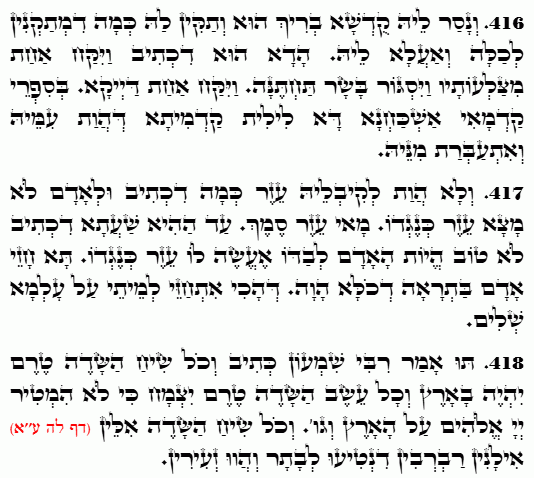Daily Zohar # 4976 – Beresheet – Adam’s two ribs
Description
<input type="hidden" value="68f6ef9d56ce54060106808" /><input id="bg-show-more-text-68f6ef9d56ce54060106808" type="hidden" value="Show DZ reading video" /><input id="bg-show-less-text-68f6ef9d56ce54060106808" type="hidden" value="close view" /><button class="bg-showmore-plg-button bg-blue-button bg-arrow " id="bg-showmore-action-68f6ef9d56ce54060106808" style="color: #fffff; font-size: 14px; font-weight: normal;">Show DZ reading video</button>
Daily Zohar 4976

Hebrew translation:
417. וְלֹא הָיָה כְּנֶגְדּוֹ עֵזֶר, כְּמוֹ שֶׁכָּתוּב וּלְאָדָם לֹא מָצָא עֵזֶר כְּנֶגְדּוֹ. מַה זֶּה עֵזֶר? סֶמֶךְ. עַד אוֹתָהּ שָׁעָה שֶׁכָּתוּב לֹא טוֹב הֱיוֹת הָאָדָם לְבַדּוֹ אֶעֱשֶׂה לּוֹ עֵזֶר כְּנֶגְדּוֹ. בֹּא רְאֵה, אָדָם אַחֲרוֹן הַכֹּל הָיָה, שֶׁכָּךְ רָאוּי לְהָבִיא שָׁלוֹם עַל הָעוֹלָם.
418. עוֹד אָמַר רַבִּי שִׁמְעוֹן, כָּתוּב וְכֹל שִׂיחַ הַשָּׂדֶה טֶרֶם יִהְיֶה בָאָרֶץ וְכָל עֵשֶׂב הַשָּׂדֶה טֶרֶם יִצְמָח כִּי לֹא הִמְטִיר ה’ אֱלֹהִים עַל הָאָרֶץ וְגוֹ’. וְכֹל שִׂיחַ הַשָּׂדֶה – אֵלּוּ עֵצִים גְּדוֹלִים שֶׁנִּנְטְעוּ אַחַר כָּךְ וְהָיוּ קְטַנִּים.
.
Zohar Beresheet
Continued from previous DZ
#416
And the Holy One, blessed be He, sawed him, meaning that He separated the female from the male and rectified her as one rectifies (prepares) a bride. And He brought her to him. And this is what is written: וַיִּקַּח אַחַת מִצַּלְעֹתָיו—”And He took one of his ribs” (Genesis 2:21 ),* “one” is precise. That is, he had two ribs, and He took one of them. And it says: In the book of the ancients, I found that the rib that was not taken is Lil-th the first, who was the first wife of Adam and was removed from him.
Notes:
“וַיִּקַּח אַחַת מִצַּלְעֹתָיו” (Genesis 2:21 ): Rashi explains “rib” as a side, symbolizing the creation of woman as a partner. In the Zohar’s Kabbalistic framework, it represents the separation of Nukva (female, Malchut) from Zeir Anpin (male), with ‘rib’ (צלע, tzela, side) signifying Nukva’s initial unity with Zeir Anpin before her rectification as a bride. Lil-th, the unrectified klipah, is the rejected rib, contrasting Eve’s (חוה) perfected zivug.
#417
And Lil-th was not a helper for him, as it is written: וּלְאָדָם לֹא מָצָא עֵזֶר כְּנֶגְדּוֹ—”And for Adam, He did not find a helper for him” (Genesis 2:20 ).* What is the meaning of a helper? A support. That is, she was an evil klipah, and he could not rely on her. And she was with him until that hour when it is written: לֹא טוֹב הֱיוֹת הָאָדָם לְבַדּוֹ אֶעֱשֶׂה לּוֹ עֵזֶר כְּנֶגְדּוֹ—”It is not good for man to be alone; I will make a helper for him” (Genesis 2:18 ).* For then she was removed from him. Come and see: Adam was the last of all the created beings; therefore, he needed to come into the world as a complete man. Therefore, Lil-th was removed from him, and Eve (חוה) was given to him in her place.
Notes:
“וּלְאָדָם לֹא מָצָא עֵזֶר כְּנֶגְדּוֹ” (Genesis 2:20 ) and לֹא טוֹב הֱיוֹת הָאָדָם לְבַדּוֹ אֶעֱשֶׂה לּוֹ עֵזֶר כְּנֶגְדּוֹ (Genesis 2:18 ): Rashi interprets ‘עֵזֶר כְּנֶגְדּוֹ’ as a partner who aids or opposes, symbolizing balance. In the Zohar, Lil-th, an evil klipah, fails as a helper, disrupting the zivug with her unrectified judgment. Eve, as Nukva, is the true ‘helper’ (עֵזֶר, ezer), completing Adam’s spiritual wholeness in the zivug.
#418
Rabbi Shimon further said: It is written: וְכֹל שִׂיחַ הַשָּׂדֶה טֶרֶם יִהְיֶה בָאָרֶץ—”And every shrub of the field before it was in the earth” (Genesis 2:5).* And every shrub of the field, these are the great trees after they were planted, and they were still small. Therefore, the verse says “and every shrub of the field before it was in the earth,” its meaning is not that they were not at all, but that they were still small. And the Zohar explains before us who these trees are.
Notes:
This Zohar study details the separation and rectification of Nukva (חוה) from Zeir Anpin, contrasted with Lil-th, the unrectified klipah. The “rib” (וַיִּקַּח אַחַת מִצַּלְעֹתָיו, Genesis 2:21 ) signifies Nukva’s initial unity with Zeir Anpin, separated to become a rectified bride (Eve), unlike Lil-th, who fails as a helper (לֹא מָצָא עֵזֶר כְּנֶגְדּוֹ, Genesis 2:20 ). The “shrubs” (וְכֹל שִׂיחַ הַשָּׂדֶה, Genesis 2:5) are developing sefirot or souls in Malchut, awaiting growth through the zivug.
Main Point: Nukva (חוה) is separated from Zeir Anpin’s “rib” and rectified as a helper, unlike Lil-th (klipah), with developing sefirot (“shrubs”) in Malchut awaiting growth via the zivug, reflecting creation’s spiritual completion.
{||}
The post Daily Zohar # 4976 – Beresheet – Adam’s two ribs appeared first on Daily Zohar.




